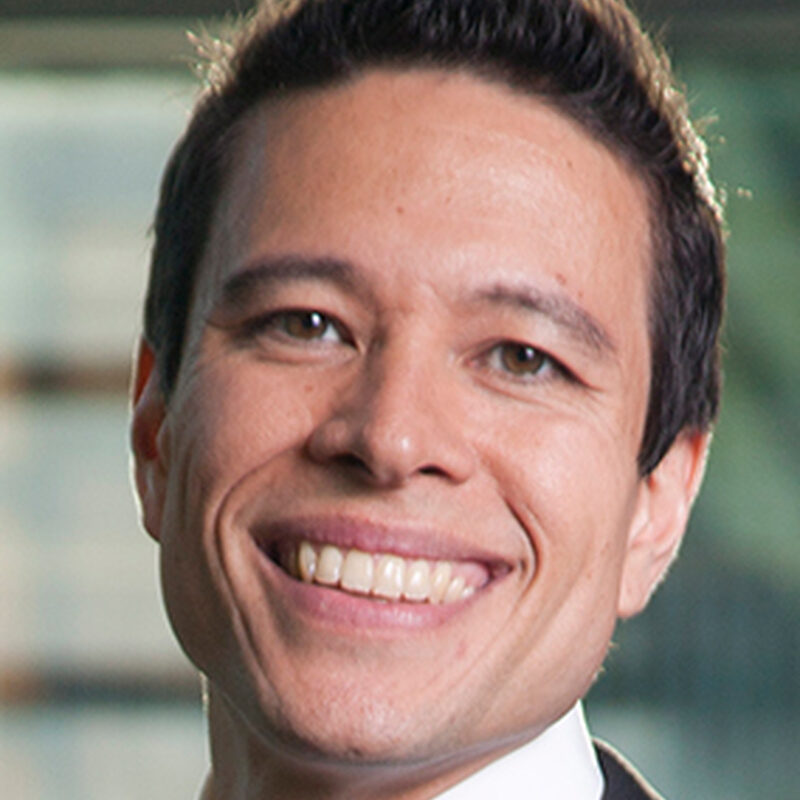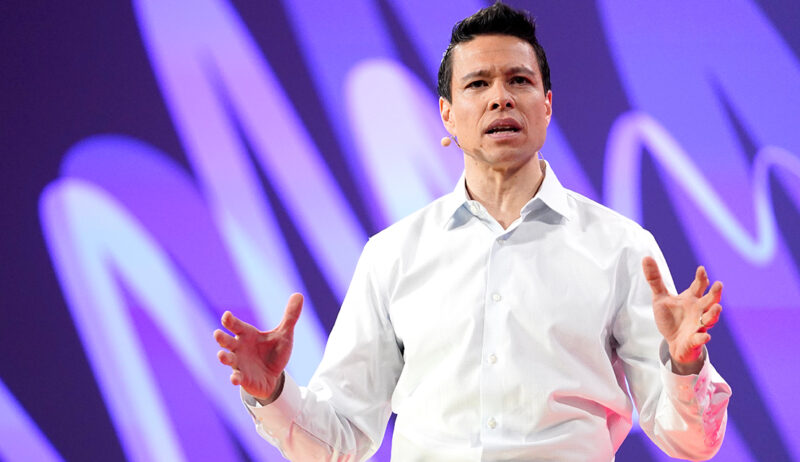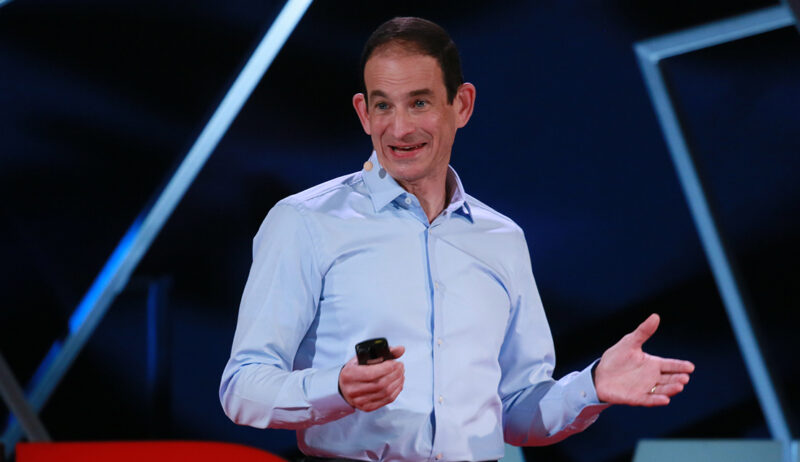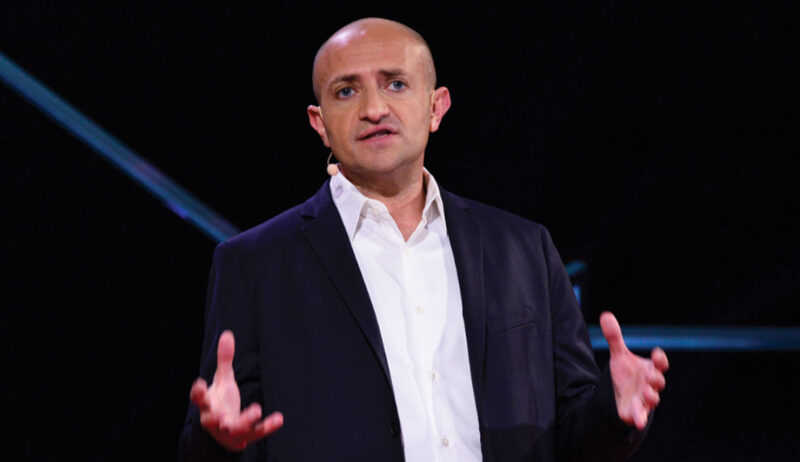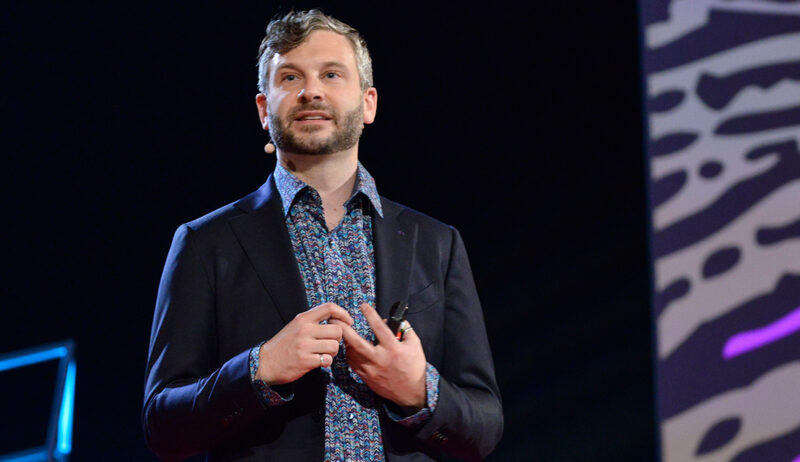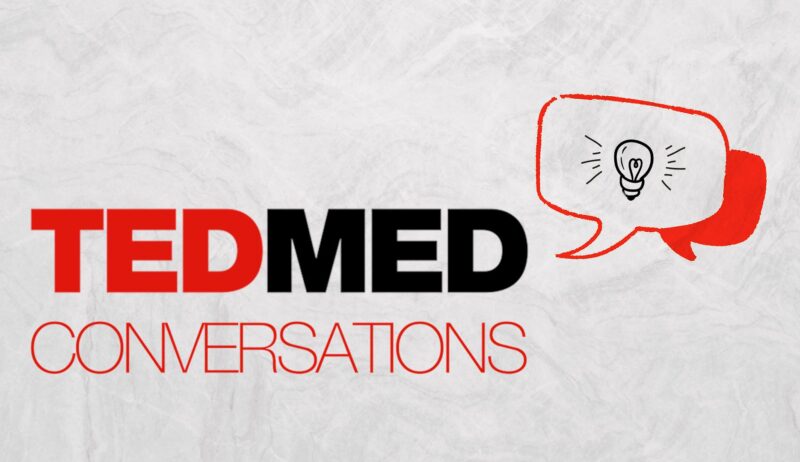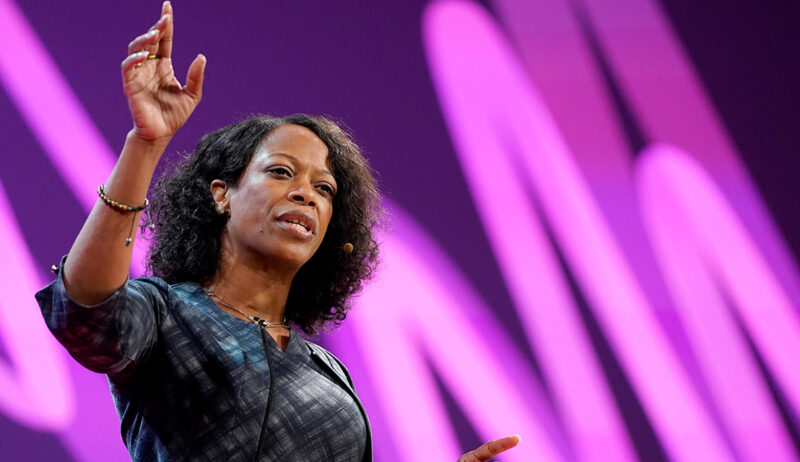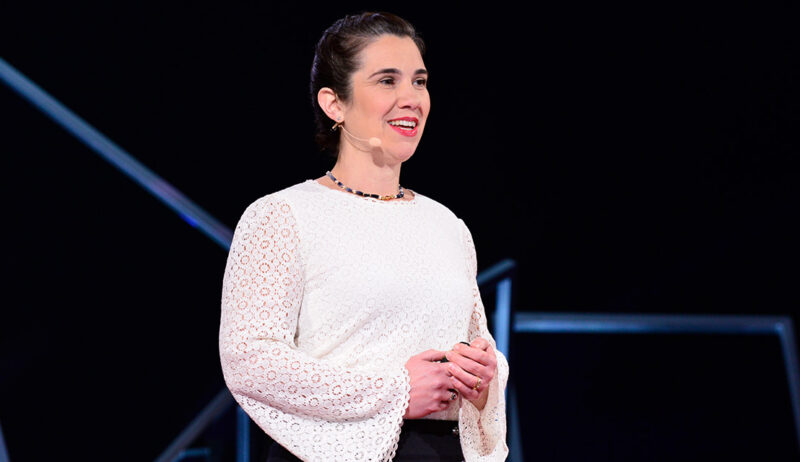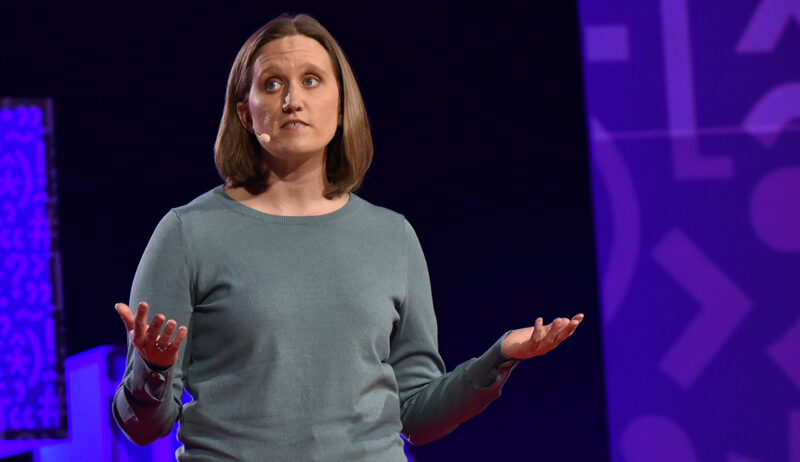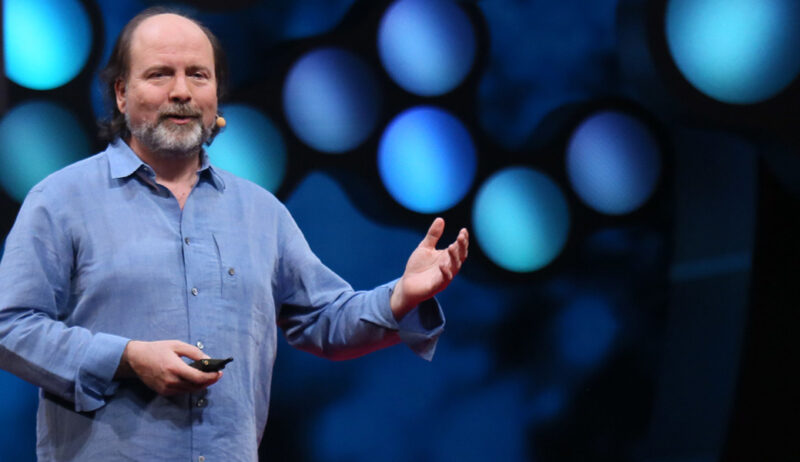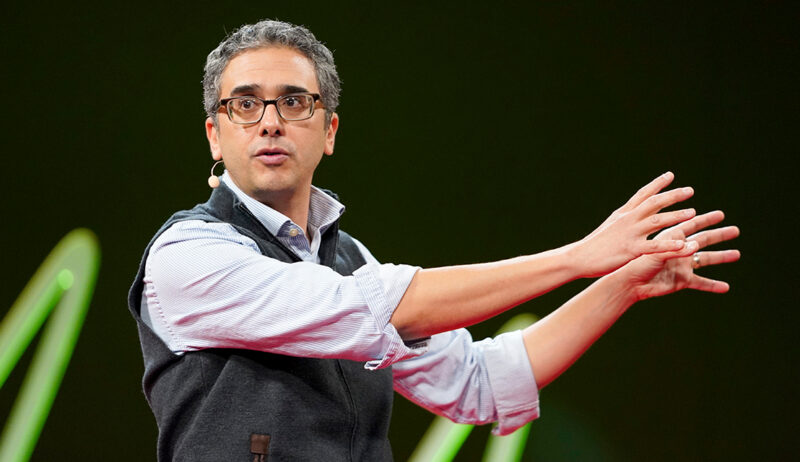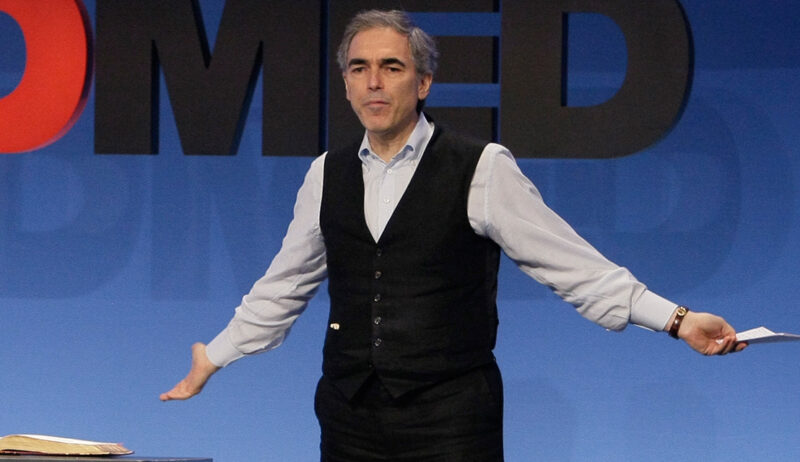The future that I think this field is betting on and a future where we’ll be able to unpack some of the really difficult why questions that the law asks every day in courtrooms across the country, really across the world. Why did you do that?
You are listening to TEDMED Conversations, where we share stories in health and medicine to inspire change for a healthier world.
I’m your host, Kelly Thomas. Today, I’m speaking with Doctor. Francis Shen, Professor of Law and faculty member in the graduate program in neuroscience at the University of Minnesota and Chief Innovation Officer at the MGH Center for Law, Brain and Behavior.
We explore the emerging interdisciplinary field of neuro law and how advances in neuroscience and neurotechnology can be responsibly integrated into the legal system to improve decision making and outcomes. We also talk about Francis’s journey as a masters hurdler and how competing as an adult athlete has introduced him to an inspirational community.
Francis, thank you for sitting down with TEDMED today. I am excited for this conversation.
Thanks for having me. Excited to talk.
So you are director also of the Shen Neurolaw Lab at University of Minnesota, where you have a very interesting lab motto, every story is a brain story. I’m curious how you came up with that, and also how it applies to the cross disciplinary mission of the lab.
Great question. I don’t know exactly the moment when I thought of the phrase, and maybe someone had thought of it before, though I haven’t seen it before, and I hadn’t seen it before. The origin story is that I’m grounded in the law. So I’m a law professor and was working around issues related to legal responses to trauma, especially survivors of rape and sexual assault, and returning combat veterans.
This was in the, you know, mid two thousands, early two thousands, when we were fighting wars in Iraq and Afghanistan. And what I was observing was that the law was really poor at understanding and explaining experiences that couldn’t be seen or felt physically, and that’s the experience of many of who experience different types of trauma. And that led me to look at the psychology of trauma, and then eventually the neuroscience of trauma, and led to my moment, which was, well, all these things I care about in law and policy, better criminal justice system, better education system, It’s really about the way that our brains engage with the rest of our body and engage with the world, our processing information in the way that that information processing gets changed, adjusted, improved by our colleagues, by our interaction, by the things we put in our body, and so forth.
And then I kind of just took a step back and said, wow, it’s not just those who’ve experienced trauma, it’s not just those in the legal system, it’s all of us, and that our stories are really intimately tied to, and in many ways created by our brains, and that’s the origin of every story is a brain story. And then that connects with everything I do because I see the law, and I see policy making through this brain lens.
Neuro law is an emerging field, which you are pioneering with some others. What are you most excited about, and how neuro law is being used today?
What I’m most excited about is advances in neurotechnology. The reason that we’ve become to understand the brain is so important is because of the technologies that allow us to look at the brain while we’re still alive. So we don’t have to wait until someone dies and crack open the skull and do an autopsy. We can see in different ways brain function and brain structure while we’re still functioning.
And those advances in technology have led to the place where we’re in now, both kind of medically and legally. But it’s the future that I think this field is betting on, and a future where we’ll be able to unpack some of the really difficult why questions that the law asks every day in courtrooms across the country, really across the world. Why did you do that? Why are you continuing to do that even though we’re telling you not to?
Why can’t you get your act together? Those are mysterious questions, but they’ll become less mysterious, and we’ll get more precise answers as these technologies allow us to figure out, okay. Here’s why when you’re confronted with a situation like this, you’re making some of these decisions. And then that’s gonna lead to better interventions, both in the legal system and just in our sort of social systems.
Say, okay, here are some conditions in which it’s going to be more likely for you to make choices that are going to make you better off and make all of us around you better off too.
Can you give us an example of a case where you found some new neurotechnology was really important in changing the way the judge viewed the case or the outcome?
Yeah. So there’s a kind of a conceptual case, and it happened in Michigan a number of years ago now. And the basic gist of the case was that, it’s called Allen v Bloomfield Hills, and there’s a guy named Charles Allen, who’s a lifelong Amtrak conductor, great guy, family man, and one day, inexplicably, as he’s coming along, he comes up to crossing guard gates, and this school bus swerves around the gates and tries to get in front of the bus and skate by. And the train hits the bus.
Thankfully, are no kids on the bus, but the bus driver is seriously hurt. And mister Allen is really traumatized by this experience, because he says later, your worst nightmare as a train conductor is to hit a car, and especially to hit a school bus. So he can’t go back to work, and he brings a lawsuit. Basically says, you need to compensate me, sues the school district that owned the bus, and kinda regulated the driver.
And the reason the case is so powerful is that mister Allen really didn’t have scratches on his body. Remember, he’s the conductor in this big train. So it’s really clear that he had the traumatic experience and gets PTSD. It’s pretty clear why, because he had this crazy horrible experience, but it’s also clear, and this was kind of my entry into the whole field, that he can walk fine, he can sit down, and if you and I looked at him, he’d look okay, But there was something inside him, and particularly something inside his brain that wasn’t okay.
So the district court, which is the first thing the way you go, the trial court says, you can’t really recover here because there’s a statute that says you have to have bodily injury to recover, and your PTSD is not bodily injury. But he gets brain scans, and he goes to the appellate court, and they see the logic of the argument, which is a very powerful logic, and says that PTSD and other types of mental disorders, they’re facilitated by these interactions between physical brain cells. It’s part of the body. The brain is part of the body.
The appellate court says as much and finds in his favor. It sort of opens up this new window to all sorts of different legal possibilities. Everyone in Michigan gets really excited or concerned if you’re an insurance provider, I guess, and goes up to Michigan Supreme Court. The night before they’re about to go to trial, they settle.
So we don’t get sort of what’s called binding case law. But it’s a case that I love to teach. It’s a case that sort of opens us up and raises these questions about how does the law conceptualize physical and mental injury. And I think that the law right now does a really poor job of responding to mental health, mental injuries.
And I think the main reason is that we can’t see it. So too often, we sort of just dismiss it as you’re just having a bad day. We wouldn’t say that if you took a x-ray of somebody’s femur and it was broken. You wouldn’t say, maybe go to sleep and you’ll be better tomorrow.
Because we can see it, and hopefully in the future, we’ll be able to see more and understand more of what’s going on in mental life, and then have a better response from law and from policy.
Are those some of the studies that you’re doing in your neuro law lab, looking at MRIs or different types of scans and different brain states and how the brain might look different to the control group?
It’s a great question. So we have done some collaborations with imagers. A lot of what we’re doing right now is trying to apply the sort of work you’re describing being done by others into the legal system amidst a lot of uncertainty.
So it’d be great if some lab actually, I’m talking to you now from something called the Masonic Institute for the Developing Brain at University of Minnesota, where I’ll be working with colleagues here later today. And as I’ll tell them, they do lots of brain scans of kids and young adults and emerging adults. If that brain scan sort of told us exactly what the law should do. But it doesn’t.
It gives us a little bit more information. And then the job of our lab at this intersection is to work with judges, and courts, and probation and parole officers, and others in the legal system to first help understand what this brain science is, and what it isn’t, because it can be easily misused, or it can be over claimed. And then to think about, alright, how do you handle the uncertainty that comes with the behavioral assessment, the neurobiological assessment. So that’s really where a lot of our focus is right now.
We’ve been doing some really cool programs with judges, like spending a year with them, and overnight retreats. The judges are hungry for this information in a lot of different ways. Issues around cannabis that they’re seeing in their courtroom, or aging and dementia issues. And it’s a similar theme, different set of science, different type of application, different legal doctrine, but the same core challenge of the law has to make a decision today.
We don’t have the luxury of saying check back in ten years when the research has developed.
So, on one hand, we’ve got to make a decision, but what can we glean from the science as imperfect and as haltingly not yet done as it is today? And that’s probably the central challenge that we’re tackling right now.
That makes complete sense to me because as we age, our bodies are physically aging, so of course, our brain is aging with us and and changing.
What are we learning about the aging brain that you can apply to the law and these different types of cases, adolescents or someone who might be suffering from dementia or someone who is suffering from PTSD? Do you foresee that being incorporated into the law and the policy?
Yeah. I do, and it’s already happened. So at the group level, where the science is stronger, we know some things really well. We know we’ve known for decades, maybe centuries, maybe forever, that there’s something which we now call the age crime curve, and roughly that means that five years don’t commit crimes, and eighty five year olds don’t commit crimes.
And what happens is the curve kind of goes up, starting around thirteen, fourteen, fifteen, not too many, but then sixteen to twenty two, twenty four, twenty five. That is the zone where there’s the highest likelihood of committing a crime. And then it, know, tails off. Well, it turns out that that correlates with now what a lot of neuroscientists have discovered about brain maturity.
There are different systems and different circuits in the brain, and they each mature at a different rate. By the time kids are eight, there are some things that they’re already able to do as well as adults. But there are many things that will change. And in fact, sort of doing things well is probably not the right way to state it, because there’s some real evolutionary advantages to being a risk taker. This is why people look back, and they’ll drive past a college campus and say, oh, to be young again, because they see people doing what are crazy things.
It’s a really good feature, actually, but that can get us into some real trouble as well because we discount future risk, risk aversion is less. And that’s been taken into account by the US Supreme Court in changing our understanding of what is cruel and unusual under the Eighth Amendment. And so, based in part on neuroscience, the Supreme Court has ruled over the last twenty years that we cannot have the death penalty for those under eighteen. We can’t have life without the possibility of parole automatically, even for homicide offenders under eighteen, and a series of other protections. And they cite the neuroscience all the way up to the Supreme Court. So it’s having a real impact, and in fact, the kind of cutting edge of that scholarship just and litigation as well.
Why just stop it at eighteen? Because, really, the neuroscience suggests maybe it’s early to mid twenties, and and Massachusetts has already moved forward and raised their age. So we’re seeing a lot of effort there. With respect to aging even later in life, there’s tremendous need for more research around degenerative diseases, the different types of dementia, including, but not limited to Alzheimer’s disease, frontal temporal dementia, Parkinson’s, a number of others. I think it’s fair to say that that research community wishes they could have made more progress.
Alzheimer’s disease, to take one example, remains a disease where, at present, we’re getting better and better at detecting the early warning signs, and being able to tell someone in their mid forties, in their fifties, something about likelihood of onset based on genetics, and our neurobiology, and other measures.
But, problematically, we don’t have a cure. So this leads to conundrums about whether it’s insurance coverage, or it’s whether to take an experimental drug, you know, what to do.
We are, though, really aware of some things that, you know, that don’t work for everyone, but work for most people, and that’s this intimate relationship between environment, and the things we put in our body, and our brains. And I’m going go back to what I said before, that one of the reasons that all this brain stuff, and brain storage are so challenging is we never see the brain changing.
We see the rest of our body parts change. So someone in the weight room lifts a bunch of weights, and they can see their bicep getting bigger. And in fact, that’s how they measure progress. No one has ever said to me, boy, your brain is looking great, because we can’t see the brain yet.
But what we’re able to learn from research is that the things we put in our bodies, so that would be diet, but also chemicals, environmental pollutants, and the like, or good stuff, affects things. Sleep has a tremendous effect on the way that our brains develop. And again, we don’t see it. We’re not even conscious. Right? We’re just lying there unconscious. And yet, are scientists who are sort of figuring out, boy, there are all these cool things that are happening.
Exercise is a major way in which brains can age in a more healthy way. But again, you almost have to take someone’s word for it because you can’t see it yourself, you know. And that’s, again, why I think the future is going to be one where we actually are able to see brain progress, and that will really bring people around. And the last thing I’ll say is that the visualization part of neuroscience has been really important in the law.
The ability to put a brain scan in front of jury members and have them change. And I think it will be clinically as well. And the doctor can tell you this, this, and this, but when the doctor shows you at some point a picture of your brain and says, Francis, here’s what your brain looked like a year ago, then you changed your diet and exercise, here’s what it looks like now. That’s not the way clinical medicine works right now.
I see a future in which that is, and once that starts to happen, I think people will come around because it’s so visceral. And without it, it just remains too mysterious. But, yeah, diet, exercise, and friendship, those are really, really good things, and there’s a whole neuroscience of loneliness kind of line of research as well, which is very powerful.
Do you think that infusing neuroscience into the law will be able to keep up with all the things that we’re learning about the brain? How does the law keep up with the emerging data and in a safe and practical way?
Well, that’s a really tough question, and it’s a good one. There’s this book that I’m trying to finish up, and I used this quote from a really important legal scholar named Roscoe Pound, has been deceased now, former dean of Harvard Law School, and his quote is really simple, but it’s really profound. It says, the law must remain stable, and yet it cannot remain the same. And the law is inherently conservative, and not in like a political sense, but in just a we don’t like to change too much.
So law will always lag, I think, technological development. We’re seeing it right now in AI. Right? The laws wrap and social media, and all these things, trying to catch up quickly.
It does eventually catch up. I think with neuroscience, it would be really good, and that’s what a lot of our work is, if we’re prepared for that future so that it doesn’t catch us unawares. But the trick is that you don’t want to prepare for a future that never comes. Right?
Like a false earthquake is like, we’re we’re ready for we’re all prepared. Yeah. The earthquake didn’t happen. You know?
The the end of the world didn’t come.
So we try to be really realistic and think about, alright, what is actually likely to happen in the next, you know, five, ten years, and then beyond that, you know, ten to twenty five years. So I do think the law will keep up. I think we’re going to need new voices in the law, so we are really excited. We’ve got a new Dana Foundation funded training program. It’s called the Neurotech Justice Accelerator at Mass General, so it’s a Boston based program. It’s awesome with colleagues, and we’re trying to train the next generation of leaders in these fields, leaders who will be around much longer than I will be and sort of guide the law and policy and be the sort of leaders in the field of neural law.
I have a few follow-up questions to that, but we’ll start with AI. We’re just seeing all the time in the news, AI in health care, AI in medicine, AI in everything, and how we’re going to manage it. How are the current advances in AI being applied right now in neuro law?
So, AI is really important for neuroscience and law for a couple reasons. One is that a lot of the motivation, the inspiration for the systems that are being developed is the human brain.
It’s not reverse engineering the brain, because that’s difficult, but it’s thinking through ways in which you can artificially do the things that the brain does. That’s ultimately the goal. So all of this works, say, around ChatGPT, or the new Siri, and what we’re trying to do is create a nonhuman information processing system that feels and produces, and maybe even looks eventually a lot like the information processing systems that we call humans, like we call our friends. So that’s one big thing, is that neuroscience is the target of a lot of AI.
The second is that neuroscience is being used, and has been used for a long time now, in different ways of machine learning, to process and understand lots and lots of neural data. So the ability to collect a bunch of data from the brain more and more and more and more, I mean, orders of magnitude more, doesn’t do you a lot of good if it’s just a human there trying to, like, sort through all the data. It’s just too much. And so you need the AI to make sense of it.
And then a third way is that AI is being used directly to address the neurodegenerative disorders, to address mental health disorders, to try and create interventions to improve behavior and mental outcomes. A Google search will result in hundreds of companies that are trying different ways to approach this. I’m involved in some ethics and law work with some of those. And, again, there’s a lot of potential promise there.
It’s really challenging, but some promise, because we have a real gap in mental health care. We have really long wait line for people who want consults and counseling. And one of the ideas is that AI could play a role in improving brain health by augmenting, maybe replacing, but certainly just, at a minimum, augmenting types of care modalities that are already in place. So I think those are three ways that it’s already happening, and neuroscience technologies, neurotech, most probably are utilizing in one way or another advances in AI.
So that’s really synergistic, and it’ll be really interesting to see how it all develops. But AI came up pretty quickly, so I was teaching law and AI back in twenty sixteen. I remember talking with the students. It was the first course in our building on it.
So do you think anyone else in this building has any idea what’s like like, no. No. Right? Because it wasn’t a thing yet, and then it suddenly, over the course of five, seven years, became a huge thing.
And neuroscience has not had that moment yet, but it will. I I have no doubt that it will.
As this progress continues, are you seeing already different policies and laws be put into place that can help assure that the advances in AI will be used properly?
Yeah. There’s a lot of conversation around data privacy, brain privacy, sometimes called neuro rights. But I think broadly, it’s a question about making sure that individuals have control and power as much as it’s possible over where their data goes, and who it’s shared with, and how it’s used. And so state legislatures, and national governments, both in the US, and the EU, and beyond, are coming at this from a lot of different angles, and with a lot of different considerations.
But it’s a really hot topic. I think it will continue to be, and I think the neural data part of that, as well as what I say is sort of data that allows you to infer a brain state. So smartphone data, you know, if someone’s sitting there and all their queries to the search engine are about self harm, that’s a really important indicator. And actually, that’s a good example where there’s this balance between, on one hand, you want someone’s data to be their own.
On the other hand, if there are enough warning signs, both for protecting them or for protecting others, intervention, or at least a potential intervention, seems like it might be on the table. And that’s a here and now question. Those things are happening today. So that digital phenotyping space, digital psychiatry, the integration of objective measures into psychiatry, That’s all happening in real time right now.
Most aren’t aware of it, but that’s, you know, that that’s the front lines. And so the legal protections need to be there. Are they there yet? No. I don’t think so. I think there are a lot of gaps, but and I also think there’s this balance between not wanting to overregulate and getting that balance right. So it’s an ongoing conversation.
Seems very cross disciplinary, and parties coming from so many different places. Is that what the makeup of your neural law lab looks like as well? And what types of students and trainees are there?
That is exactly what our lab looks like. So our trainees, over the last two years, they’ve come from, on the medical side, psychiatry, neurology, radiology, On the law side, you know, all types of law students, criminal law, health law, FDA law. The undergrads come from a variety of backgrounds. It might be neuroscience background, political science, government, economics, computer science.
So our range is really broad, and I think everyone in the lab finds some way to utilize and leverage their talents, and learn from everyone else. And what I care about is the law, is better courtroom decisions, improve courtroom decisions, and improve policy in legislatures. And that requires not just synthesis, but some hard choices. And so, I’m excited that a lot of our future projects are very heavily thinking about very practical questions.
They’re influenced, they’re grounded in, they’re aware of the more complex discussions that are necessary.
But, it’s like, okay, you get a sentence for one year, or two years, or five years, and what is the person going to do while they’re sentenced? That’s what it boils down to, and hopefully, those types of decisions will be improved eventually through our work.
Have you found that judges and other lawyers are open to this possibility of incorporating neuroscience into the law to help make those choices?
Yes, if it’s concrete, and no, if it’s abstract. So the judges that I’ve worked with across the, you know, political spectrum too, you know, one the things I say at the beginning is this is neuroscience and lies, like a get out of jail free card on the criminal side, or on the civil side, it’s not just for the plaintiff’s attorney. Insurance can benefit from this stuff too.
So it has to be, I think, neutral. We’ve really focused a lot on that to try and make sure that this science doesn’t get politicized, and I think right now we’ve done a pretty good job of that. You know, my hope is that brain science continues to be a lot like cancer research, everyone’s had a loved one who’s who’s experienced cancer, and everyone’s had a loved one who’s had a a mental challenge, or a brain health challenge. That’s one way to keep the judges and the lawyers engaged.
And the second thing is to be really concrete and realistic. Something that our colleagues do when we do our judges training is make sure that, as my colleague, doctor Judith Edersheim says, we’re not gonna show you the Ferrari, because you don’t have the Ferrari to pull out of your garage. You’ve got very limited resources. Let’s give you the actual type of model, the type of recommendations that you could implement in a heavily resource constrained environment, and that’s tough.
So we really think about that realistic concrete work. And something that we emphasize a lot is that it’s hard to predict human behavior. A good example would be the NFL draft, where millions and millions and millions of dollars are spent on these really smart people, and they’re trying to predict who’s going to be the next good quarterback.
And they fail all the time. But one of the things that they’re careful about is that because they know it’s hard to predict, they offer contracts, or they get out of them after a while. And we don’t do that too much in law, unfortunately. We sort of give a sentence for two years, or five years, or twenty years, and we might check back in with you really close to when you’re let out for early release.
But what we ought to be doing is evaluating performance, brain performance, how are you processing information regularly to see if there’s any progress. And for some, there might not be, and you’d have to stay incarcerated or find something else, and for some, there might be, in which case, okay, turns out you don’t need to be here fifteen years because we’ve been checking annually, and there’s actual progress. So that’s just a totally different way of thinking about the legal system, but it’s a way that’s very attuned with the neuroscience of neuroplasticity, and just what we know about how brains change, especially, as I was saying, in those early critical periods.
Your twenty eight was already different than twenty two. Thirty five is definitely different than twenty two. So maybe in the law, we might take that into account and create a system where we’d actually check-in annually and have some data. I hope we get to that point.
I haven’t seen a system that sort of fully embraced that. I think there are parts of it that get picked up. But I think something like that would resonate, certainly in the interest of public safety. It’s still in the interest of holding someone accountable.
So, I said, it’s not a get out and jail free card, but it’s an individualized process. Whether it’s in the criminal law or in medicine, the individualization piece is really critical.
Absolutely. And, you know, that sounds like it would also inspire and give people hope. You know, okay. I’m incarcerated, but if there are check ins and I am trying to do the right thing, then maybe my outcome is different.
Thinking back to what you said also about what we put into our bodies and how that changes our health span over time, if we were checking in to look at how not just our physical selves are affected by what we’re eating, but our brain also, then that might change the way people pay attention to how they are treating their body.
I would hope so. I think you’re absolutely right. I think that it’s just so easy because you don’t see the you just don’t see the effects at all until it’s too late.
And there is a lot of individual variation as well, and that makes it difficult because it’s not the case that everyone who does x is going to end up with outcome y. We’ve all probably have a relative, you know, who smoked their whole life but never got cancer.
Okay. But that but but but what? And yet, that’s what we’ve got. You know, we’ve got these individualized needs, but we’ve got sort of generalized medicine.
And, you know, the push is towards precision and individualized medicine in a lot of areas. You know, my brother’s an oncologist. We talk about this all the time. And his whole world is, instead of just placing all of these ten people who present with similar symptoms in the same box, is to take their genetic information, really careful histories, look at down at the cellular level, and say, you know what?
Actually, you might benefit from this combination of chemo and this. And you might benefit from these things. That individualized approach in medicine is a smart way to go, and I think the individualized approach in law is a smart way to go.
And, but in order to do that, you’ve got to see, on the medicine side, like, is it working? Let’s try this for six months. Let’s see if it’s working.
And, in psychiatry, the way that we see it’s working right now is it’s just self report, which is a really good place to start. I’m not saying we eliminate it, but we’re going to rapidly be in the future. I’ll give you a very concrete example. Somebody walks into the office, they probably couldn’t get the appointment, so it’s been six weeks, let’s say, since they last.
How you been sleeping? You know? So that’s taking six weeks of sleep data, and I’m sure that the person’s probably going to say, oh, yeah. Pretty good.
I’m gonna sleep. We’re we’re going to be in a future where instead of that imprecise answer, it can start with, okay, I’m looking at your individualized sleep data from your sleep tracking, and here’s how it’s been the last six weeks. That starting with that objective data. And that’s going to transform, I think, care.
Like, oh, yeah. Boy, I haven’t been sleeping well. Or I thought I was, and I wasn’t. Or actually, I’m doing pretty well.
Those indicators and then the last thing I’ll say is that you’re so right about incentives. So where this digital psychiatry is going, the app makers already know this. That’s why any app where they like addiction, for the kids, it’s like they always get that next reward. Oh, I wanna get three more points.
I wanna get two more. And so now, it’s like, what are those? Little cake points. What but those sorts of things really matter, and because they can see it, right?
It’s visceral. You can see the pile going up. You can see the number going up in the corner. As we get more stuff like that, first, it’s going to be behavioral, like number of steps, say, that’s been a thing for a while.
But once it becomes brain data, I’m really sure people are going to respond, and certainly those who want to, but probably some that don’t. It’s like, wow, okay, I’m seeing my brain change, and I think that’s going to have a big effect.
Speaking of rewards and responses and training, you are a very fast hurdler. I watched a video of you hurdling, but you’re a master’s hurdler, and you’ve been doing this for a very long time, since you were a kid, and I think it’s amazing. I’m a competitive tennis player. I was as a kid, and I get to do that as an adult, and I love it. What is it about hurdling that brings you back time and time again, and how do you think that is affecting your brain health?
Well, with the caveat, as I was just saying, I can’t actually see how it’s affecting my brain health. I think it’s had a major and positive impact. This will be my thirty third consecutive year of competitive hurdling. I run over now thirty nine inch barriers and thirty six inch barriers. So there are two races. One is straight down a straightaway, called a hundred ten meter hurdles, and the other, like, once around an outdoor track, four hundred meter hurdles. The hurdles for me are a place to get away from everything else, you know, a very busy life, family, and work, and everything.
So it’s a very spiritual experience. I think what’s important for me is that it’s very competitive, and it’s a way that, as a competitive person, it fuels that. It also, it’s a daily confrontation of fears because you never know, especially as you get older, if this is going to be the day when you can sort of no longer do it or no longer do it in the right way. And so, you know, I’ll run hurdle workouts and track workouts, and what happens is that you train your brain to conquer these challenges, and you do it again and again and again.
So that’s, you know, tens of thousands of hours of doing it, and it begins to pay off in other areas as well. So the same sorts of emotional feelings or ability to overcome challenges and obstacles that I have experienced on the track translates really well into other sorts of moments of life. Still to this day, what’s really fascinating to me is that although my body is very different than it was at age sixteen, mentally, when I get into the starting blocks and sort of right on your mark, set, go, like the nerves and the you know, I’ve done that so many times, but it’s still the same experience mentally.
In fact, one of the challenges, I’m sure you experience the same as well, is that for anyone who’s still competing, your brain wants to do things that your body probably can’t do, so you have to modify it a little bit.
The other thing I’ll say is that there are fewer and fewer opportunities. I think it’s a problem as we age to have what were very normal activities in high school, and then for those competed in college. And same thing I say in the arts, you know, students who found their amazing fulfillment in theater, and then it falls out. And exercising those circuits of our brain, to me, is really important.
And again, it’s because we can’t see it. We can’t see the atrophy. Right? Like, which we would if we, you know, stopped using some other part of our body for a long time.
So, yeah, it’s eye opening. It’s really engaging. It’s a great community. I’d encourage anyone to to pursue their passions later in life, whether they’re athletic or artistic or elsewhere, I think it’s been a major, major boon for my mental health.
And it’s hard to describe, but a big component of it.
I agree. It’s incredibly inspiring. I feel the same way the community, not just the competition and the preparation and the other things that you have to do to compete to maintain your physical fitness, but the community of people, mostly women because it’s a women’s league that I compete in, has really just lifted me up to people I would never have met.
Speaking of community, one of the emerging areas of neuroscience that I think is really important is the neuroscience of loneliness, or maybe the positivist spin is sort of the neuroscience of social connection.
It turns out that scientists are finding how loneliness reshapes the brain in ways that are not good. And the flip side of that is that strong social connections, friendships, familiar relationships, really strengthen circuits in the brain that promote mental health, that promote resilience.
It’s sometimes been called the silent killer loneliness, because, again, you can’t see it. Somebody can tell you I’m lonely. You can see if someone’s lonely. We’ve all felt loneliness, and it kind of feels crummy, but it also, I think, tends to feel like something that we should just get over.
Like, it’s a very individualized thing. I’m just going to wake up tomorrow and stop being lonely. But it’s a neurobiological process, just as the way, or a neurobiological state, just as these other things are. I think recognizing that, and again, there’s a big behavioral literature on the value of connectedness, social connectedness, both sort of individually and then in larger groups.
That’s a really important thing to keep in mind, both for the law and thinking about how we might improve outcomes for those who are justice involved, and for policymaking, and frankly, just for the way that we navigate our lives.
Maybe just remember the next time somebody is experiencing loneliness, you can think about that as a brain issue because it is, and the evidence is really clear that it is. And that also means that positive interventions can improve brain health in that context too.
What has been the most exciting moment you’ve had, or the most surprising thing that has happened as an adult athlete?
Competing in world international competitions has been the coolest thing. I had known about them
